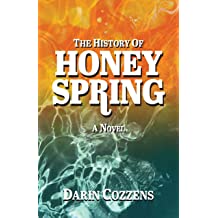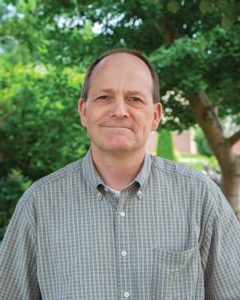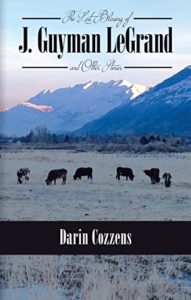 Darin Cozzens introduces his novel The History of Honey Spring, published in 2022 by Zarahemla Books.
Darin Cozzens introduces his novel The History of Honey Spring, published in 2022 by Zarahemla Books.
Book blurb: Utah native Jim Ray is the only child of deceased parents. When he comes home from war in April 1966, he also finds himself the only heir of a distant and dying cousin in Wyoming. On paper, the inheritance includes almost four hundred acres in the Balford Valley and a water source known as Honey Spring. But Jim soon learns that he has inherited much besides cropland and swamp pasture. The spring, it turns out, is more than a geographic divide between neighbors. Thanks to the vicissitudes of fortune, the history of that divide is a history of friendship soured by grief and loss, envy and ambition, accusation and suspicion. Moving into a community polarized by the rift, Jim realizes that he has survived one kind of war only to become entangled in another. He can perpetuate the fight, or, because of his growing feelings for a girl from the other side, he can make the first moves toward forgiving and healing. Finally he must decide his place in the history of Honey Spring.
From its conception, The History of Honey Spring was going to be about the rending of a friendship between two neighbors. That rending would start with inequities in love and fortune, and would be helped along, as such rendings usually are, by suspicion, envy, blame, and bitterness.
But gradually it occurred to me that the rending of the friendship—with members of the wider community taking sides—was only half the story. I became even more interested in the possibility of mending—that is, in the way such a division might be healed. While the two neighbors themselves never reconcile, their heirs and the townspeople do. Most obviously I entrust that reconciliation to the union between a boy from one side of the spring and a girl from the other. But given the context, given the history, the only soil this union could take root in is the soil of peacemaking and forgiveness.
So—rending or mending. Which theme would be the novel’s main theme? In trying to write my way to a decision, I was profoundly influenced by something Wendell Berry once said about one of his own stories. Almost thirty years ago his “Pray without Ceasing” made it into The Best American Short Stories of 1993 (selected by Louise Erdrich with Katrina Kenison). The story is a beautiful testament of a division averted. And it is averted by the proposition that grudges and enmities, as characteristic as they are of human experience, are no more characteristic than the possibility of making peace. As Berry put it in his comment in the “Contributors’ Notes”:
That “things fall apart” is undoubtedly the dominant truth of our time. The story we are most familiar with is probably the story of the disintegration of cultures and ecosystems, of communities, families, marriages, and even the characters of individual people. But in the face of this general falling apart, some things also hold together. It has taken me a long time to see that the way things hold together is as much a story as the way things fall apart. Forgiveness too is a story that can be told.
Whether falling apart or holding together, rending or mending, makes the better story is, I suppose, impossible to determine. What is not so impossible to determine is the enormous, and at least equal, importance of the latter in what we call real life. What I appreciate about Berry’s comment is that it legitimizes peacemaking as a subject of serious contemporary fiction. That such a legitimizing is necessary in our storytelling over the last several generations is implicit in his statement.
The world is a hard place, and men and women are born unto trouble. I am aware of both of those truths. But hope and redemption are true, too. And by temperament, by upbringing, by religious faith, I am inclined, I confess, to try to give them their due. To whatever degree I have achieved that end in The History of Honey Spring, the work of the writing will have been justified.
 Darin Cozzens is the author of Light of the New Day and Other Stories and The Last Blessing of J. Guyman LeGrand. He has written numerous stories that have appeared in Greensboro Review, Cimarron Review, Weber Studies, River Oak Review, and Irreantum. His most recent story is forthcoming in the fall 2022 issue of Weber: The Contemporary West. He teaches at Surry Community College in Dobson, North Carolina.
Darin Cozzens is the author of Light of the New Day and Other Stories and The Last Blessing of J. Guyman LeGrand. He has written numerous stories that have appeared in Greensboro Review, Cimarron Review, Weber Studies, River Oak Review, and Irreantum. His most recent story is forthcoming in the fall 2022 issue of Weber: The Contemporary West. He teaches at Surry Community College in Dobson, North Carolina.


.
Compelling pitch!